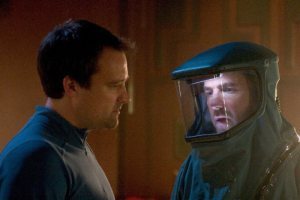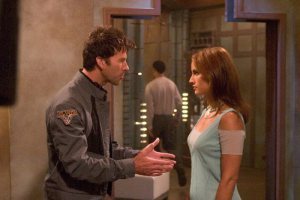June 14, 2012: Familiar territory! Days of Stargate Past, Atlantis! Hot Zone! Sanctuary!
The other day, I was back in familiar territory, at The Bridge Studios, the former home of Stargate: SG-1, Stargate: Atlantis, and Stargate: Universe, present home of Once Upon A Time, and Brightlight Pictures the company producing the SF miniseries Paul and I are writing. I dropped by to get notes on the script, toss around some ideas for the second draft, and pick up a book that was sent to my old office. It was nice to see some familiar faces, like Bill the security guard -

Halt! Who goes there?!
And the gang in Admin -
- who were wondering when we’d be coming back. Well, soon. Hopefully.
I suppose it’s only appropriate that the visit to my old stomping ground coincides with my little trip down memory lane, reflecting back on Stargate: Atlantis’s first season.
HOT ZONE (113)
Following three wide open, all-out, kick-ass episodes, we shift gears to something a little more…self-contained. When members of the science team investigating unexplored sections of the city fall victim to a frightening contagion, Atlantis enacts security protocols, placing itself under lockdown. It’s another great episode for McKay that lays the groundwork for future stories – first and foremost the introduction of the Asurans, the mysterious creators of the nano-virus, but also Rodney’s sister Jeannie (who will end up making a few guest appearances in the coming seasons).
Again, what really stands out for me in this episode is less the threat faced than the reactions of our heroes – specifically, John Sheppard. In the opening two-parter, it is suggested that he’s a bit of a rebel, a loose cannon who has problems with authority. In later episodes he shows great courage and determination in the face of danger and yet, at the same time, also demonstrates a frustratingly cavalier attitude toward his commander, Weir. In Underground, he goes over her head by making defacto deals with the Genii. And in this episode, he openly challenges her authority by ordering Sgt. Bates to disregard her orders. Ultimately, Sheppard gets his way and his actions end up making an already bad situation worse when his intervention allows the nano virus to spread to the mess hall and endanger the lives of everyone there. In the end, he puts HIS life on the line and his heroic actions save the day, but he is surprisingly unrepentant in his post-plague discussion with Weir.
WEIR: But you are not the one who decides what is and what is not a military situation. Now, both General O’Neill and Colonel Sumner warned me that you don’t respect the proper chain of command.
SHEPPARD: Well, sometimes I see a situation a little different than …
WEIR: No. Listen to me, John. Now, you endangered yourself and the lives of many others.
SHEPPARD: Because I thought it was the best course of action to take — and, by the way, I saved your ass.
WEIR: I know you did — but you have to trust me.
SHEPPARD: I do!
WEIR: Do you?
Sheppard is let off the hook (more or less) because he saves the day, but how different would his conversation with Weir have been had any of the individuals in that mess hall died? Should the legitimacy of one’s actions be contingent on their results? Please discuss.
SANCTUARY (114)
Hmmmm.
Hmmmmmmmmm.
My least favorite episode of the show’s five year run, probably the franchise’s seventeen season run. The story plods along at an unnervingly leisurely pace and the characters act – well – surprisingly out of character. Gone is the adorably curmudgeony McKay we’ve grown to know over the first half of the season, replaced by a miserable, humorless imposter. Our charming anti-hero, Sheppard, meanwhile, is transformed into a lovestruck schoolboy, picnicking on Atlantis and making the moves on a woman he barely knows. And when McKay calls him on it, Sheppard responds by almost throwing down with him. Dude, this is Rodney. Remember Rodney? The guy who saved your life two episodes back? The bulk of the episode is dedicated to entertaining the mysterious Chaya while McKay attempts to figure her out. Eventually, he learns the truth in a reveal that is at once strange and underwhelming. ”Yep, I’m an Ancient.” (Cue shoulder shrug). ”Let’s have cosmic intercourse.”
The episode is bookended by action sequences that, while exciting, don’t really make a whole lot of sense upon closer scrutiny. Why was the jumper attacked by darts in the opening? There was mention of a possible hive ship nearby but we never see it. And why is the planet attacked again at the end? Is it merely an enormous coincidence that the wraith just happened upon Proculus during the events of this episode (and while Chaya was away?)? Or have the wraith been demonstrating staggering patience by staking out the planet for generations, just waiting for an opportunity to strike?
Things bounce back in a BIG way in the next episode, Carl Binder’s brilliant Before I Sleep.
A reminder to cast your vote for your favorite Stargate mid-season two-parter for a chance to win some signed scripts. To ensure a fairer distribution of votes, I’ll be picking a random voter from the winning mid-season two-parter AND a random voter from one of the other nominated two-parters.
Polls close next Tuesday night!
Tagged: Atlantis, film and television, science fiction, scifi television, SF television, SGA, Stargate, Stargate: Atlantis, television

Joseph Mallozzi's Blog
- Joseph Mallozzi's profile
- 39 followers








